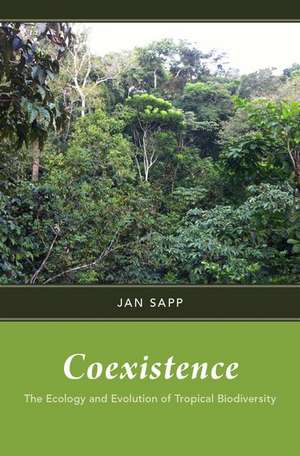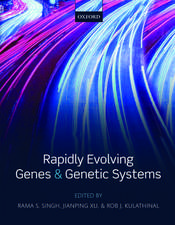Coexistence: The Ecology and Evolution of Tropical Biodiversity
Autor Jan Sappen Limba Engleză Hardback – 8 dec 2016
Preț: 396.33 lei
Preț vechi: 545.37 lei
-27% Nou
Puncte Express: 594
Preț estimativ în valută:
75.85€ • 82.36$ • 63.71£
75.85€ • 82.36$ • 63.71£
Carte tipărită la comandă
Livrare economică 12-18 aprilie
Preluare comenzi: 021 569.72.76
Specificații
ISBN-13: 9780190632441
ISBN-10: 0190632445
Pagini: 290
Ilustrații: 27
Dimensiuni: 236 x 157 x 25 mm
Greutate: 0.57 kg
Editura: Oxford University Press
Colecția OUP USA
Locul publicării:New York, United States
ISBN-10: 0190632445
Pagini: 290
Ilustrații: 27
Dimensiuni: 236 x 157 x 25 mm
Greutate: 0.57 kg
Editura: Oxford University Press
Colecția OUP USA
Locul publicării:New York, United States
Recenzii
This book can be recommended as additional reading, 'addressed to anyone who is interested in the ecology and evolution of life on earth'. I totally agree with this statement made by the author.
Coexistence is a fascinating chronology and reconstruction of the history of the science of tropical ecology in the Western Hemisphere.[...] [It] provides a fascinating and comprehensive overview of the evolution of tropical forest and marine ecology and their rapidly expanding research sphere. [...] it is also a fascinating chronology of a detailed and skillfully researched scientific history that both scientists and lay readers can learn from and enjoy.
This is a meaty book that cannot be read quickly but must be contemplated and absorbed. Although it is focussed primarily on tropical ecology, it is also a fascinating chronology of a detailed and skillfully researched scientific history that both scientists and lay readers can learn from and enjoy.
...it is interesting and thorough. A perfect read for first-year graduate students planning PhD fieldwork in Panama.
A jewel of a book: a wonderfully written, multi-faceted history of tropical biology as seen through the lens of the Smithsonian Tropical Research Institute and the major roles of its scholars in shaping understanding of the tropics -- knowledge which is essential in grasping both the very wonder and the central role of the tropics in biology.
Coexistence is a comprehensive synthesis of the scientific developments over the last one hundred years that have contributed to advancing our knowledge of the evolution and ecology of tropical organisms. Jan Sapp masterfully weaves a narrative about scientific innovation with a history of events in Panama and Washington that enabled the Smithsonian Tropical Research Institute to emerge as a leading contributor to biodiversity research.
Coexistence brilliantly examines how prescient leaders build great institutions that provide the freedom and support to do great science. Sappâs story of the Smithsonian in Panama and the breakthroughs achieved there in basic understanding of the remarkable species diversity of tropical forests and coral reefs captures the essence of the excitement and conflict that make for great science.
Sapp's Coexistence is a hybrid. It combines a centurylong history of field research centered on the Barro Colorado Island (BCI) with an overview of ideas in tropical ecology as they evolved over time.The approach works well because the author alternates drier chapters on science with livelier descriptions of often colorful characters and their doings in Panama.
Coexistence is a fascinating chronology and reconstruction of the history of the science of tropical ecology in the Western Hemisphere.[...] [It] provides a fascinating and comprehensive overview of the evolution of tropical forest and marine ecology and their rapidly expanding research sphere. [...] it is also a fascinating chronology of a detailed and skillfully researched scientific history that both scientists and lay readers can learn from and enjoy.
This is a meaty book that cannot be read quickly but must be contemplated and absorbed. Although it is focussed primarily on tropical ecology, it is also a fascinating chronology of a detailed and skillfully researched scientific history that both scientists and lay readers can learn from and enjoy.
...it is interesting and thorough. A perfect read for first-year graduate students planning PhD fieldwork in Panama.
A jewel of a book: a wonderfully written, multi-faceted history of tropical biology as seen through the lens of the Smithsonian Tropical Research Institute and the major roles of its scholars in shaping understanding of the tropics -- knowledge which is essential in grasping both the very wonder and the central role of the tropics in biology.
Coexistence is a comprehensive synthesis of the scientific developments over the last one hundred years that have contributed to advancing our knowledge of the evolution and ecology of tropical organisms. Jan Sapp masterfully weaves a narrative about scientific innovation with a history of events in Panama and Washington that enabled the Smithsonian Tropical Research Institute to emerge as a leading contributor to biodiversity research.
Coexistence brilliantly examines how prescient leaders build great institutions that provide the freedom and support to do great science. Sappâs story of the Smithsonian in Panama and the breakthroughs achieved there in basic understanding of the remarkable species diversity of tropical forests and coral reefs captures the essence of the excitement and conflict that make for great science.
Sapp's Coexistence is a hybrid. It combines a centurylong history of field research centered on the Barro Colorado Island (BCI) with an overview of ideas in tropical ecology as they evolved over time.The approach works well because the author alternates drier chapters on science with livelier descriptions of often colorful characters and their doings in Panama.
Notă biografică
Jan Sapp received his PhD in the history of science from the University of Montréal in 1984. He subsequently held an appointment at the University of Melbourne for 8 years, where he served as chair of the department of History and Philosophy of Science. He was visiting associate professor at the University of Massachusetts, Amherst (1990-1991) and then Andrew Mellon Fellow at the Rockefeller University, 1991-92. He subsequently accepted an appointment at York University in Toronto, and he was Professor and Chair in the Department of Science and Technology Studies before moving to the Biology Department in 1996.; Professor Sapp held the Canada Research Chair (Tier 1) in the History of the Biological Sciences at the University of Québec at Montréal from 2001 to 2003 of which he remains an Associate; he returned to the Biology Department at York University. He is also a Research Associate at the Smithsonian Tropical Research Institute, Panama.











